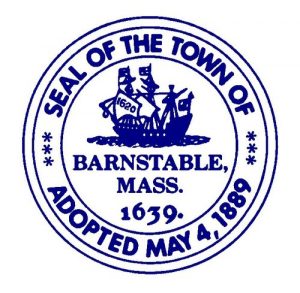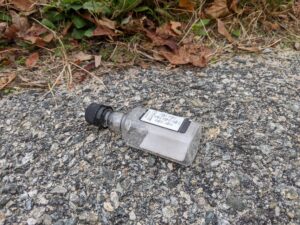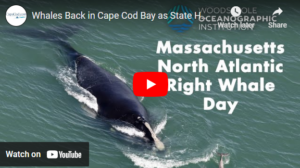EASTHAM – The International Fund for Animal Welfare (IFAW) was on the scene in Eastham after about a half dozen pilot whales stranded. The incident happened Tuesday on Cape Cod Bay near North Sunken Meadow Beach. According to reports a calf did not survive but volunteers are working to assist the others.
From IFAW:
• Six [long-finned] pilot whales stranded north of Sunken Meadow Beach in Eastham, MA this Monday (yesterday) evening. After 24 hours of monitoring and supportive care, experts from IFAW (International Fund for Animal Welfare) are still onsite to rescue and refloat the five surviving animals in Tuesday’s evening high tide.
• The pilot whales were first spotted swimming in shallow water in Eastham around 4:45pm, just after dark on Monday. A small team from IFAW was able to examine the whales and satellite tag two in hopes they would find their way in the overnight high tide.
• “We had scouts out early in Eastham on Tuesday morning, and were able to confirm that five of the animals had survived, with a young calf having succumbed to the stranding,” reported Brian Sharp, IFAW Director of Marine Mammal Rescue & Research. “Our teams began a day-long phased approach to provide supportive care while awaiting more favorable tides later in the day, around 3:20pm.”
• As a mammals, pilot whales have lungs and breathe air. Dolphins and small whales can indeed live out of water for many hours when receiving proper supportive care and hydration. IFAW experts bring decades of experience responding to mass stranding events on Cape Cod, considered a global hotspot for live cetacean stranding.
• Historically, pilot whales do strand on Cape Cod. They are typically a more off-shore species, and these strandings are less frequent, but they do happen.
• IFAW typically transports dolphins to deeper water using a custom-built rescue vehicle, so why not these pilot whales? At noon, Sharp, reported: “Some of these animals are very large, the largest of which we estimate to weigh almost 4,000-lbs or almost two tons. Right now, our team is performing health assessments on all the animals, providing supportive care, giving IV fluids to help combat the effects of stress and shock from the stranding. We’re looking at options to be able to refloat these animals. Right now, we just need the tide to come in and help us refloat because these animals are so large. So we’re doing everything we can right now to give these animals a shot at the best outcome.”
• The attempted refloat of the pilot whales is on hold. All five were refloated and released just before 4pm, but four of the whales unfortunately turned back toward shore. From Misty Niemeyer, stranding coordinator at IFAW: “The five pilot whales swam off well in one direction together, but the reality is that we cannot celebrate a success yet this evening. One animal is now offshore, but the others did not follow. We will keep an eye on them tomorrow and evaluate next steps.”
• Niemeyer concludes “The team is exhausted. Large animals can be quite dangerous to work around, and it’s for our health as well as tomorrow’s continued efforts that we need to call it a day today.”
• Again, photos, video and a recorded audio quote found HERE.
Update from IFAW 5 PM Wednesday: The four remaining animals have now been euthanized. A fifth has not yet been located.
The pilot whales had greatly declined in health and were debilitated after three days of stranding. The team made the difficult decision to euthanize these animals as we knew rescue efforts at this stage were no longer going to be possible. It’s the most humane decision to make in a circumstance like this. They were in a difficult area and in tougher weather and lighting conditions as the exhaustion (for them) of this effort went on. They passed quickly, which is another sign the timing was right.
This is tough on all of our responders. We were cautiously optimistic and put a tremendous amount of work into this effort. If you were there, you likely felt our hopefulness as the whales first swam off at the end of the day yesterday.
Misty Niemeyer, our Stranding Coordinator at IFAW, has recorded an added video to camera in the folder here: https://spaces.hightail.com/space/5655NipbCL
Video by David Curran/Satellite News Service/CWN (used with permission)
























